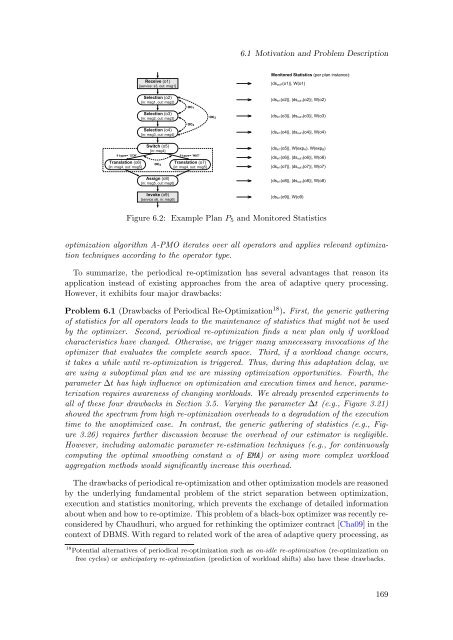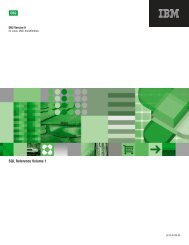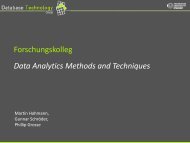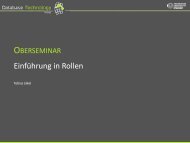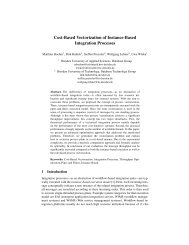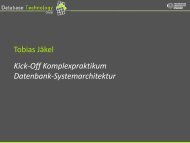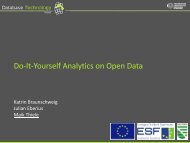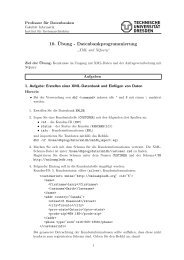Cost-Based Optimization of Integration Flows - Datenbanken ...
Cost-Based Optimization of Integration Flows - Datenbanken ...
Cost-Based Optimization of Integration Flows - Datenbanken ...
- No tags were found...
You also want an ePaper? Increase the reach of your titles
YUMPU automatically turns print PDFs into web optimized ePapers that Google loves.
6.1 Motivation and Problem Description<br />
Receive (o1)<br />
[service: s3, out: msg1]<br />
Monitored Statistics (per plan instance):<br />
|dsout1(o1)|, W(o1)<br />
Selection (o2)<br />
[in: msg1, out: msg2]<br />
Selection (o3)<br />
[in: msg2, out: msg3]<br />
Selection (o4)<br />
[in: msg3, out: msg4]<br />
oc1<br />
oc2<br />
oc3<br />
|dsin1(o2)|, |dsout1(o2)|, W(o2)<br />
|dsin1(o3)|, |dsout1(o3)|, W(o3)<br />
|dsin1(o4)|, |dsout1(o4)|, W(o4)<br />
@type='SCM'<br />
Translation (o6)<br />
[in: msg4, out: msg5]<br />
Switch (o5)<br />
[in: msg4]<br />
oc4<br />
@type='MAT'<br />
Translation (o7)<br />
[in: msg4, out: msg5]<br />
|dsin1(o5)|, W(expA), W(expB)<br />
|dsin1(o6)|, |dsout1(o6)|, W(o6)<br />
|dsin1(o7)|, |dsout1(o7)|, W(o7)<br />
Assign (o8)<br />
[in: msg5, out: msg6]<br />
|dsin1(o8)|, |dsout1(o8)|, W(o8)<br />
Invoke (o9)<br />
[service s6, in: msg6]<br />
|dsin1(o9)|, W(o9)<br />
Figure 6.2: Example Plan P 5 and Monitored Statistics<br />
optimization algorithm A-PMO iterates over all operators and applies relevant optimization<br />
techniques according to the operator type.<br />
To summarize, the periodical re-optimization has several advantages that reason its<br />
application instead <strong>of</strong> existing approaches from the area <strong>of</strong> adaptive query processing.<br />
However, it exhibits four major drawbacks:<br />
Problem 6.1 (Drawbacks <strong>of</strong> Periodical Re-<strong>Optimization</strong> 18 ). First, the generic gathering<br />
<strong>of</strong> statistics for all operators leads to the maintenance <strong>of</strong> statistics that might not be used<br />
by the optimizer. Second, periodical re-optimization finds a new plan only if workload<br />
characteristics have changed. Otherwise, we trigger many unnecessary invocations <strong>of</strong> the<br />
optimizer that evaluates the complete search space. Third, if a workload change occurs,<br />
it takes a while until re-optimization is triggered. Thus, during this adaptation delay, we<br />
are using a suboptimal plan and we are missing optimization opportunities. Fourth, the<br />
parameter ∆t has high influence on optimization and execution times and hence, parameterization<br />
requires awareness <strong>of</strong> changing workloads. We already presented experiments to<br />
all <strong>of</strong> these four drawbacks in Section 3.5. Varying the parameter ∆t (e.g., Figure 3.21)<br />
showed the spectrum from high re-optimization overheads to a degradation <strong>of</strong> the execution<br />
time to the unoptimized case. In contrast, the generic gathering <strong>of</strong> statistics (e.g., Figure<br />
3.26) requires further discussion because the overhead <strong>of</strong> our estimator is negligible.<br />
However, including automatic parameter re-estimation techniques (e.g., for continuously<br />
computing the optimal smoothing constant α <strong>of</strong> EMA) or using more complex workload<br />
aggregation methods would significantly increase this overhead.<br />
The drawbacks <strong>of</strong> periodical re-optimization and other optimization models are reasoned<br />
by the underlying fundamental problem <strong>of</strong> the strict separation between optimization,<br />
execution and statistics monitoring, which prevents the exchange <strong>of</strong> detailed information<br />
about when and how to re-optimize. This problem <strong>of</strong> a black-box optimizer was recently reconsidered<br />
by Chaudhuri, who argued for rethinking the optimizer contract [Cha09] in the<br />
context <strong>of</strong> DBMS. With regard to related work <strong>of</strong> the area <strong>of</strong> adaptive query processing, as<br />
18 Potential alternatives <strong>of</strong> periodical re-optimization such as on-idle re-optimization (re-optimization on<br />
free cycles) or anticipatory re-optimization (prediction <strong>of</strong> workload shifts) also have these drawbacks.<br />
169


